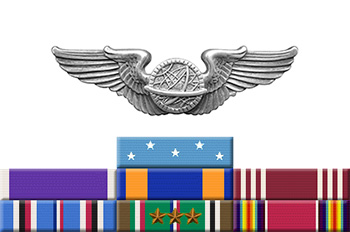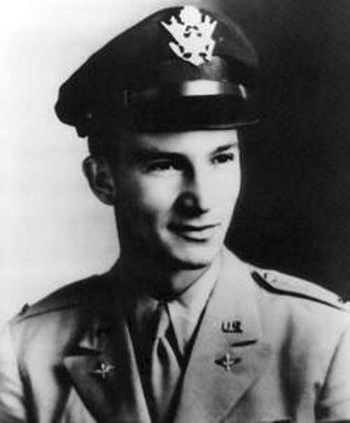Robert Femoyer was born on October 31, 1921, in Huntington, West Virginia. While attending Marshall College at Virginia Polytechnic Institute from 1940 to 1943, he enlisted in the U.S. Army Reserve on November 11, 1942, and was called to active duty to attend Aviation Cadet Training in February 1943. After washing out of flight school, Cadet Femoyer attended Aerial Gunner School and then Navigation School, earning his commission as a 2d Lt in the U.S. Army Air Forces on June 10, 1944. Lt Femoyer next attended B-17 Flying Fortress Combat Crew Training from June to September 1944, and then deployed to England, where he served as a B-17 navigator with the 711th Bomb Squadron of the 447th Bomb Group at RAF Rattlesden, England, from September 1944 until he was killed in action on November 2, 1944. He was buried at Greenlawn Cemetery in Jacksonville, Florida.
His Medal of Honor Citation reads:
For conspicuous gallantry and intrepidity at the risk of his life above and beyond the call of duty near Merseburg, Germany, on 2 November 1944. While on a mission, the bomber, of which 2d Lt. Femoyer was the navigator, was struck by 3 enemy antiaircraft shells. The plane suffered serious damage and 2d Lt. Femoyer was severely wounded in the side and back by shell fragments which penetrated his body. In spite of extreme pain and great loss of blood he refused an offered injection of morphine. He was determined to keep his mental faculties clear in order that he might direct his plane out of danger and so save his comrades. Not being able to arise from the floor, he asked to be propped up in order to enable him to see his charts and instruments. He successfully directed the navigation of his lone bomber for 2 1/2 hours so well it avoided enemy flak and returned to the field without further damage. Only when the plane had arrived in the safe area over the English Channel did he feel that he had accomplished his objective; then, and only then, he permitted an injection of a sedative. He died shortly after being removed from the plane. The heroism and self-sacrifice of 2d Lt. Femoyer are in keeping with the highest traditions of the U.S. Army.
|



